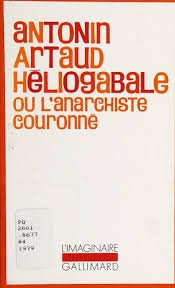HELIOGABALUS: OR, THE CROWNED ANARCHIST - ANTONIN ARTAUD (TRANS. ALEXIS LYKIARD
Damn RIP Artaud. Had you lived long enough, you’d truly be the king of schizo-posting, my favorite use of Twitter. I’d never read any Artaud before. I was aware he was an influence on surrealism, and I, like many, know about the Theater of Cruelty (great name) without having read the text that the term comes from but I’d always thought of him as a theater guy and since I’m not super into theater (maybe later in life) I’ve largely ignored him. So I was not prepared for how crazy this “novel” was. “Novel” probably isn’t even the right word, part of it, especially the beginning is a sort of historical novel that traces the life of Heliogabalus, a second century Roman emperor who is sort of remembered as a second-tier Caligula, ie a maniac and madman who fucked everything, ruined shit and then was assassinated by his own guards at the age of 18. Not unlike Caligula, there is some modern debate as to how much of the bad stuff we know about him is true, given that all the accounts that have survived are written by people with a particular ax to grind. There are serious scholars who have attempted to rehabilitate or at least complicate the history. Artaud is not doing that. Artaud is not a classicist, nor an archeologist, and he’s not interested in historical truth in the conventional sense. He’s a madman writing a book about another madman. He takes as true the most depraved rumors about Heliogabaus’ life and then spins out elaborate schizo-theories about what they mean and how they connect with Artaud’s larger world-view. Like I said, it has the feeling of a really unhinged and interesting twitter thread. There’s tons of stuff about sun-worship and moon-worship since Heliogabalus, as you might be able to tell from his name, was a devotee of a Syrian Sun-god, named Elagabalous who was worshiped in the form of a black meteorite that Heliogabalous took to Rome (which he strangely doesn’t connect to Islam). There’s lots, and lots of stuff about castration and blood and dicks and what all that symbolizes. Artaud sees chaos and disorder as a ends unto itself and thus Heliogablus as a sort of hero, given his idiosyncratic usage of “anarchy,” which should mean, “no rulers” which would make an emperor by definition the opposite though Artuad uses it to mean “agent of chaos.” Here are three quotes that seem to get at what he means by “anarchy:”
“To have a sense of the profound unity of things is to have a sense of anarchy”
“He turned the throne into a stage, but in doing so he introduced theater and, through theater, poetry to the throne of Rome, into the palace of a Roman emperor, and poetry, when it’s real, is worthy of blood, it justifies the shedding of blood.”
“The Anarchist says, neither god nor master, I alone.”
I don’t think that’s a useful definition of that word but I appreciate how insane Artuad is willing to get. The final thoughts I had about this book involve the gender and sexual identity of Heliogabalus. Earlier, Christian, writers like to paint him as depraved and gay, given his male lovers, including ones he married, and obsession with dicks and whatnot. However, he famously frequently dressed as a woman and scoured the empire offering untold wealth to anyone who could perform a surgery that would give him a pussy. Artuad uses this as a jumping off point to discuss hermaphroditism and related matters. Nowadays, I assume that we’d look at these facts and conclude that Heliogabalus would be considered transgendered had he lived in our time but that language didn’t occur (and in large part didn’t exist in the modern sense) to Artuad, which is a missed opportunity. Anyway, interesting book, worth thinking about if you’re into bizarre theory stuff. 218 Phalluses
